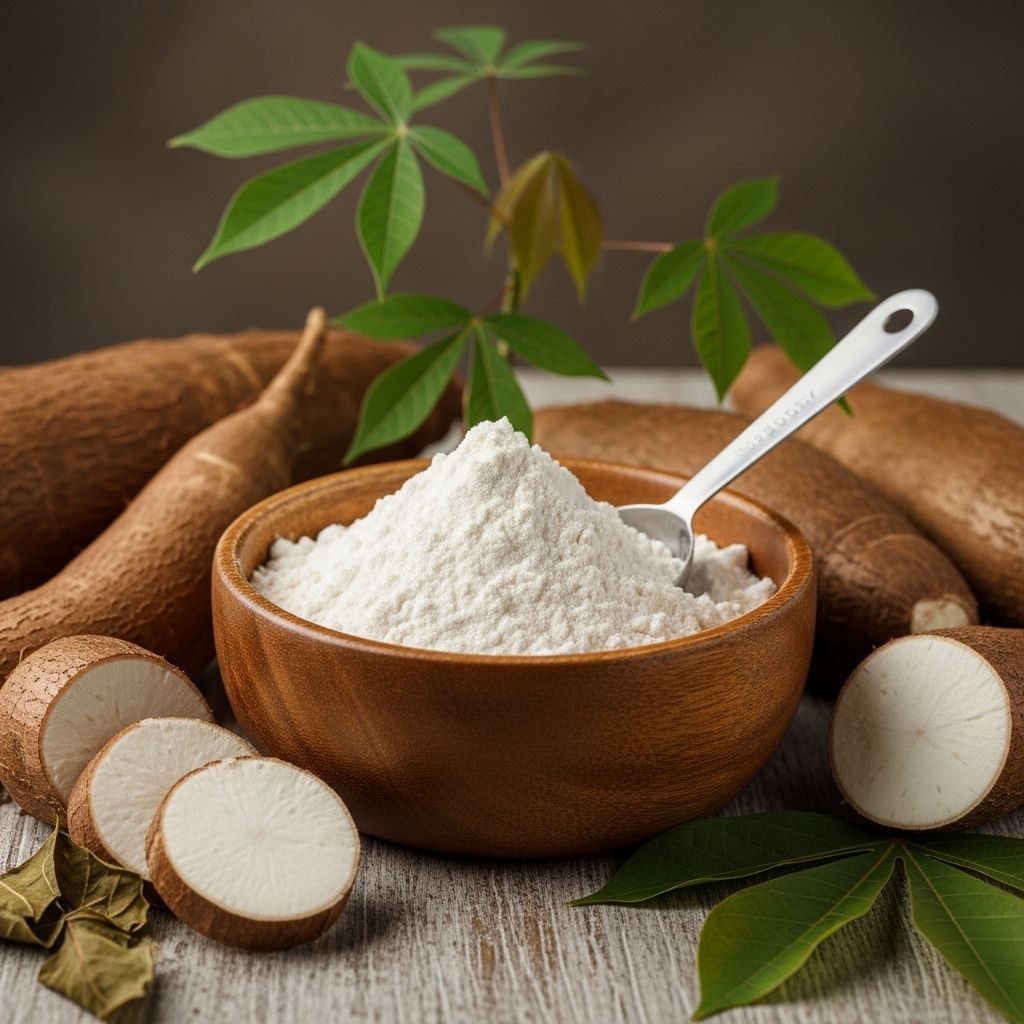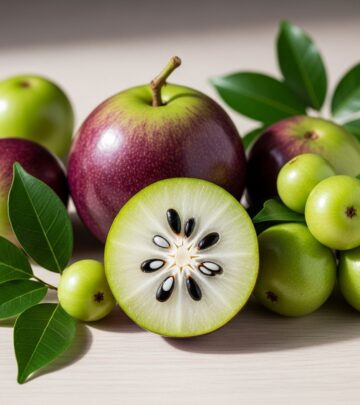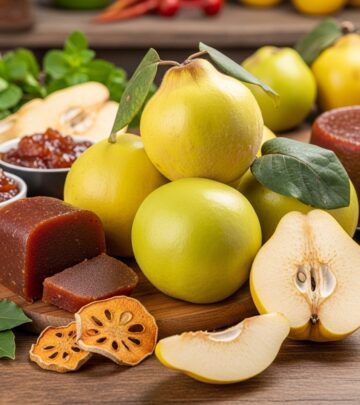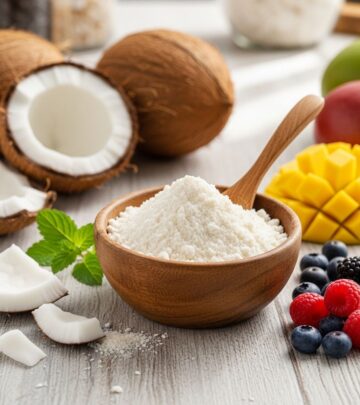Cassava Flour: Nutrition, Benefits, Uses & Risks Explained
Neutral-tasting flour feeds beneficial gut bacteria and fuels energy for active days.

Cassava Flour: Nutrition, Benefits, Uses & Safety
Cassava flour is rapidly gaining recognition as a versatile gluten-free substitute for wheat flour. Extracted from the whole root of the Manihot esculenta plant, cassava flour boasts a mild flavor and floury texture that makes it ideal for a diverse range of culinary applications, especially in gluten-free and paleo diets. But what exactly sets cassava flour apart? Let’s explore its nutritional composition, health benefits, cooking versatility, and important safety considerations.
What Is Cassava Flour?
Cassava flour is produced by peeling, drying, and grinding the whole root of the cassava plant—a staple food for millions in tropical regions. Not to be confused with tapioca starch, which is a refined extract, cassava flour contains the whole root, retaining its nutrients and fiber.
Cassava’s neutral flavor and powdery consistency make it an excellent candidate for breads, cakes, pancakes, and as a general thickening agent.
- Botanical Name: Manihot esculenta
- Other Names: Yuca, manioc, balinghoy
- Traditional Uses: Staple food in South America, Africa, and Asia
- Processing: Cleaned, peeled, dried, and finely ground
Cassava Flour vs Tapioca Flour
| Characteristic | Cassava Flour | Tapioca Flour/Starch |
|---|---|---|
| Source | Whole root | Starch from cassava root |
| Nutrition content | Moderate fiber, higher micronutrients | Almost pure carbohydrate, little fiber |
| Texture | Powdery, slightly grainy | Fine, very powdery |
| Uses | Baking, thickening, gluten-free recipes | Puddings, thickening, chewy textures |
Nutritional Profile of Cassava Flour
Cassava flour is notable for its high content of carbohydrates and its moderate supply of dietary fiber and vitamin C. It’s naturally low in protein, fat, and most other vitamins and minerals compared to other gluten-free flours.
- Calories: About 330–340 kcal per 100g
- Carbohydrates: 78–80g per 100g
- Fiber: 3–6g per 100g
- Sugar: 1–2g per 100g
- Protein: 1–2g per 100g
- Fat: Less than 1g per 100g
- Vitamin C: About 20–25% of Daily Value per 100g
- Minerals: Contains potassium, calcium, small amounts of magnesium
Note: Nutritional values may vary slightly by brand and processing method.
Health Benefits of Cassava Flour
Cassava flour can be a beneficial addition to many diets, provided it is prepared and consumed properly. Here are its most significant health benefits:
1. Naturally Gluten-Free
Cassava flour is completely gluten-free, making it an ideal substitute for baking and cooking for those with celiac disease, non-celiac gluten sensitivity, or wheat allergies.
2. High in Resistant Starch
Resistant starch functions similarly to soluble fiber and passes undigested into the colon, feeding beneficial gut bacteria and supporting digestive health. It may help improve insulin sensitivity, support metabolic health, and promote satiety for weight management.
3. Supports Digestive Health
The moderate fiber and high resistant starch content may improve gut flora, aid in regular bowel movements, and prevent digestive conditions such as constipation and gastritis.
4. Aids in Balanced Energy and Mood
Due to its high carbohydrate content, cassava flour offers a rapid energy source, making it especially beneficial for active individuals, athletes, or those with physically demanding jobs. Additionally, improved gut health from resistant starch can support mood via gut-brain signaling and serotonin production.
5. Potential Blood Sugar Management
Resistant starch and dietary fiber in cassava flour help slow the absorption of carbohydrates, potentially supporting balanced blood glucose levels and reducing spikes—an important consideration for individuals managing diabetes.
6. Cardiovascular Benefits
Cassava flour contains fiber, potassium, and magnesium, which help lower LDL cholesterol and support healthy blood pressure, thereby lowering risk of cardiovascular diseases.
7. Promotes Immune, Skin, and Hair Health
Cassava is a modest source of vitamin C, an essential antioxidant for collagen synthesis, immune cell function, skin repair, and overall skin, hair, and nail health.
8. Weight Management Support
The fiber and resistant starch content can increase feelings of fullness, reducing overall calorie intake and assisting in healthy weight management.
9. May Help Prevent Cancer
Cassava’s antioxidants (such as flavonoids, vitamin C, and carotenoids) help fight free radicals and may reduce the risk of certain cancers like intestinal, stomach, or breast cancers.
10. Improved Digestive Comfort
Pectin and beta-glucan fibers in cassava help hydrate stool and facilitate easier bowel movements, combating constipation.
Culinary Uses and Best Ways to Incorporate Cassava Flour
Cassava flour’s mild, neutral flavor profile and powdery texture make it highly adaptable to a wide range of recipes. Its ability to mimic wheat flour in taste and function is especially valued in gluten-free and paleo baking.
- Baking: Cakes, pancakes, cookies, muffins, biscuits, brownies
- Bread: Flatbreads, tortillas, pizza bases, sandwich bread
- Thickener: For gravies, soups, sauces, stews
- Coatings: Crispy coatings for frying meats or vegetables
- Pasta & Dumplings: As a gluten-free flour in pasta, gnocchi, or dumplings
For most recipes, cassava flour can be used in a 1:1 ratio as a replacement for wheat flour, but some recipes may require adjustments due to its high absorbency.
Tips for Cooking with Cassava Flour
- Sift before using to eliminate any lumps and ensure light texture.
- Mix with other gluten-free flours (like almond, coconut, or rice) to optimize nutrition and texture.
- Adjust liquid content as cassava flour can absorb more moisture than wheat flour.
- For yeast-leavened baked goods, combine with binders (like xanthan gum) due to lack of gluten.
Cassava Flour vs Other Gluten-Free Flours
| Flour Type | Calories/100g | Fiber/100g | Main Use | Best Features |
|---|---|---|---|---|
| Cassava | 330–340 | 3–6g | Baking, thickening | Neutral flavor, 1:1 substitute |
| Almond | 570 | 10g | Baking | Rich in healthy fats, nutty flavor |
| Coconut | 400–420 | 35g | Baking, thickening | High fiber, absorbs lots of liquid |
| Rice | 355 | 2g | Noodles, pancakes | Light texture, mild taste |
| Sorghum | 329 | 6g | Baking, porridge | Whole grain, earthy flavor |
Potential Risks and Precautions
While properly processed cassava flour is safe, raw cassava root contains cyanogenic glycosides, which can produce toxic cyanide if not removed. Commercial cassava flour is specially processed to eliminate these toxins, making it safe for consumption.
- Never consume raw cassava root or unprocessed flour.
- Purchase cassava flour from reputable sources that guarantee safe processing.
- Individuals with allergies to latex or certain root vegetables should exercise caution when introducing cassava for the first time.
- Include cassava flour as part of a balanced diet with diverse nutrient sources, as it is low in protein and many micronutrients.
Who Should Limit or Avoid Cassava Flour?
- People with cassava allergies or sensitivities.
- Those managing blood sugar may need to watch intake due to cassava’s high carbohydrate content—portion control is essential.
- Individuals on very low-carb or ketogenic diets may find cassava flour too high in starch for their needs.
- Always consult a medical professional before introducing significant amounts of cassava if you have existing medical conditions.
Frequently Asked Questions (FAQs)
Q1. Is cassava flour suitable for people with celiac disease?
Yes. Cassava flour is naturally gluten-free and safe for most people with celiac disease or gluten sensitivity when processed properly.
Q2. What is the difference between cassava flour and tapioca flour?
Cassava flour is made from the entire cassava root, yielding a more nutrient-dense and fiber-rich product. Tapioca flour is a refined starch extracted from cassava and is almost pure carbohydrate, lacking fiber and most nutrients found in cassava flour.
Q3. Can I substitute cassava flour 1:1 for wheat flour in recipes?
In many cases, yes, but some baked goods may require minor adjustments for liquid or additional binding agents, as cassava absorbs more moisture and lacks gluten’s elasticity.
Q4. Is cassava flour good for diabetics?
Cassava flour’s resistant starch and fiber may help moderate blood sugar spikes when eaten in controlled portions. However, due to its high carbohydrate content, people with diabetes should carefully monitor their intake and consult a healthcare provider before including large amounts in their diet.
Q5. Are there any side effects of eating cassava flour?
Processed cassava flour is generally safe. Unprocessed cassava root can be toxic due to cyanogenic glycosides. People with latex allergies or sensitivities to root vegetables may need to exercise caution. Always buy cassava flour from a reputable source.
Q6. What are the best alternatives to cassava flour?
Depending on the recipe, almond flour, coconut flour, rice flour, and oat flour can often be good alternatives. Each has distinct flavors and textures that may be more or less suited to specific recipes.
Q7. Does cassava flour have a strong taste?
No. Cassava flour is valued for its neutral flavor, making it suitable for sweet and savory dishes alike.
Q8. Is cassava flour safe for children and pregnant women?
Yes, if it is properly processed and bought from trusted brands, cassava flour is generally safe for all age groups, including pregnant women, and can help relieve constipation due to its resistant starch and fiber content. However, no single food should be relied upon exclusively in any diet.
Key Takeaways
- Cassava flour is a nutritionally rich, gluten-free alternative that can diversify your culinary and dietary routines.
- It is packed with carbohydrates, some fiber, and vitamin C—but low in protein and fat.
- Proper processing is essential to remove natural toxins, and cassava flour should always be sourced from reputable producers.
- Best used in combination with other flours for balanced nutrition and optimal results in gluten-free and paleo recipes.
- Incorporate sensibly into a varied diet alongside diverse sources of protein, healthy fats, and micronutrients.
References
- https://www.cassavaprocessing.com/Blog/cassava_flour_health_benefits_341.html
- https://www.tuasaude.com/en/cassava/
- https://www.healthline.com/nutrition/cassava
- https://www.healthline.com/nutrition/cassava-flour
- https://www.webmd.com/diet/health-benefits-of-cassava-flour
- https://www.medicalnewstoday.com/articles/cassava-flour
- https://draxe.com/nutrition/cassava-flour/
Read full bio of Sneha Tete













